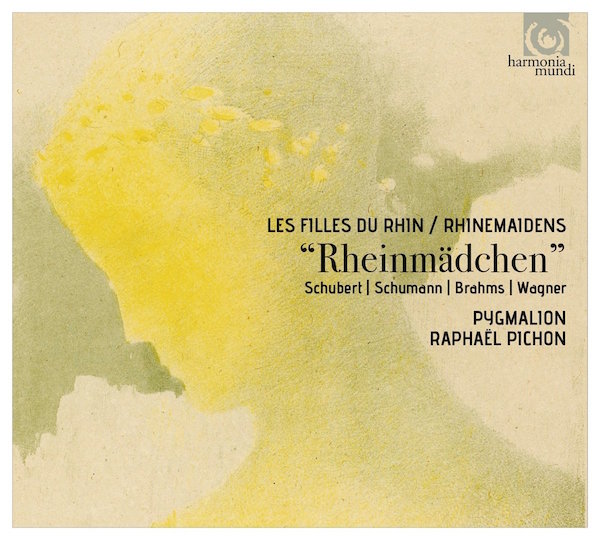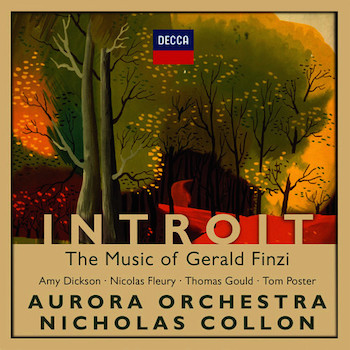Classical CD Reviews: Pygmalion’s “Rhinemaidens,” Johann Strauss’s “Der Zigeunerbaron,” and Aurora Orchestra’s “Introit”
A superior classical music concept album, a reminder of how smart and sturdy Johan Strauss’s music can be, and a problematic homage to the British composer Gerald Finzi.

By Jonathan Blumhofer
For better or worse, one of the things that classical music hasn’t always done well is the concept album. So when one comes along that offers a good idea smartly arranged and cleverly presented it necessarily stands out. Such is the case with Ensemble Pygmalion’s Rhinemaidens (on Harmonia mundi), an exploration of 19th-century music influenced, inspired, or otherwise informed by that mighty river.
There’s a lot of music, much of it truly great, that falls under this rubric, notably Wagner’s Der Ring des Nibelungen, excerpts of which bookend most of the disc’s six sections. Indeed, the arrangements of orchestral highlights from Das Rheingold, Siegfried, and Götterdämmerung can be pretty terrific: the Prologue to Rheingold, for instance, reworked for four horns, two contrabasses, harp, and twenty-four voix de femmes gets this disc off to a viscerally thrilling start.
And they don’t overwhelm the choral selections by Schubert, Schumann, Brahms, and Heinrich Isaac that follow. On the contrary, there’re more than a few commonalities to be found between these works, from the technical (a shared enthusiasm for canons between those archrivals Brahms and Wagner, for one) to the emotional.
Most of all, this album offers the opportunity to hear a mix of the relatively familiar (Schubert’s setting of Psalm 23) with some wonderfully offbeat stuff (Brahms’ “Four Songs,” op. 17 for two horns, harp, and female voices). That last – which follows a nifty adaptation of Siegfried’s encounter with the Rhinemaidens at the start of Act 3 of Götterdämmerung – is a real find, its settings of Friedrich Ruperti, Shakespeare, Eichendorff, and Ossian demonstrating a playful and strikingly inventive side of Brahms’ musical personality. Ditto his horn quartet, Ich schwing mein Horn im Jammertal.
To say that all the pieces are well played and sung is to state the obvious. The choral selections are beautifully balanced, tonally rich, and rhythmically vibrant. Bernarda Fink contributes pert, lovely solos to Schubert’s “Ständchen.” And, throughout, Emmanuel Ceysson turns in lively, vigorous accounts of the involved harp accompaniments. On all counts, then, this disc’s a keeper.

Given the nationalistic overtones of its libretto plus the countless revisions and reworkings of the score over the years, it’s perhaps no surprise that Johann Strauss’s 1885 hit, Der Zigeunerbaron (The Gypsy Baron), has fared rather less grandly than its predecessor by some eleven years, Die Fledermaus. That’s not to say its been absent from the repertoire: Strauss’s tale of an exiled gypsy who returns home to claim his fortune only to have it taken from him by the government before it’s rightfully and finally restored has been steadily performed (especially in Europe) for the last 130 years. And that’s as it should be, given that Strauss’s music for the operetta is as sophisticated, tuneful, and colorful as any he wrote.
And there are a handful of notable recordings of it, including an excellent, scholarly approach led by Nikolaus Harnoncourt in the early-90s. Now comes Lawrence Foster’s account with the NDR Radiophilharmonie and Chorus on Pentatone, which takes Michael Rot’s 2004 edition of the piece that was compiled for the New Johann Strauss Complete Edition. Its most noticeable characteristic is that it beefs up the third act a bit, though it also refocuses some of Zigeuenerbaron’s narrative: in this version (which is probably closest to Strauss’s original intent), the piece is more a celebration of its main gypsy characters than a satire of them and an ode to the Hapsburg monarchy.
As a recording, Harnoncourt’s is a tough Zigeunerbaron to top and, overall, this one doesn’t exceed the bar. But, at its best, Foster’s account comes close to matching it. He’s got a fine Zsupan in Jochen Schmeckenbecher, who blends jollity and laziness in heaping, endearing scoops. Nikolai Schukoff’s Barinkay might not be as sweet-toned as Herbert Lippert was for Harnoncourt, but he’s convincingly fervent here all the same. Claudia Barainsky’s Saffi warbles a bit for my liking and, at times, sounds a bit vocally stretched, but her singing burns with impellent passion. And Jasmina Sakr’s Arsena navigates Strauss’s acrobatic writing for her part with energy and charm.
Foster leads a performance that brims with life, if not always a characteristic Viennese schwung: tempos in a couple of numbers are deliberate and occasional, unnecessary rallentandos (including in Act 1’s “Dem Freier naht die Braut” and Act 3’s “Von des Tajo Strand” – the latter heard here, thankfully, with all its verses intact) sometimes undercut the music’s momentum. But most of the time he’s got his finger on the score’s pulse. The opening of Act 2, when Czipra, Barinkay, and Saffi find the buried treasure, is well paced and offers moments of nice color and mystery. And the waltzes lilt appropriately. In all, it’s a welcome addition to the catalogue and a reminder of just how smart and sturdy Strauss’s music – on the surface so light and frothy but underneath superbly crafted and rich with meaning – really is.

Here’s an odd, if lovingly-played, disc: Gerald Finzi was one of Britain’s great, somewhat underrated, 20th-century composers. He wrote much music after the Vaughan Williams mode, which is to say it’s often lyrical, somewhat folksy in character (though it rarely – if ever – borrows from actual English folk song), and often diatonic or outright modal in harmony. Finzi mainly wrote vocal music, though there are a handful of major instrumental works in his catalogue, too.
You wouldn’t necessarily guess that from Introit, Decca’s new all-Finzi album featuring the Aurora Orchestra. Both types of music are represented but none of the music for voice is actually sung. Rather, it’s heard here in arrangements for (mostly) solo saxophone and strings (one song, “Who is Sylvia?,” trades out the sax for a horn).
By itself that’s not necessarily a bad thing: Jan Vogler made a fine disc a couple of years ago of Schumann’s Dichterliebe in which he simply played the vocal line on his cello. But, if this recording is meant to be an introduction of some kind to Finzi’s music – and I’d imagine it is, given the relative dearth of Finzi on disc – why aren’t the songs sung? After all, Finzi was one of the finest text setters on record; how hard would it have been to simply orchestrate these selections for voice and strings?
What makes matters worse is that these arrangements, particularly the ones for saxophone, sound homogenous and bland. Amy Dickson plays them well enough but there’s so little differentiation of texture, mood, or character between the selections from Dies Natalis, two of the Five Bagatelles, and assorted songs (including “To Lizbie Brown,” “Come away, come away Death,” and “Rollicum-Rorum”) as to make the whole lot of them sound like musical wallpaper (and I say this having listened to them while following along with the scores). If the goal of an arrangement is, as I would have it, to match if not improve on the original, these all fall conspicuously short of that end.
This is particularly noticeable when one compares the arrangements to Finzi’s original instrumental works that are included here, all of which the Aurora Orchestra plays with typical warmth and understanding. There’s a lovely performance of the eponymous Introit, a movement salvaged from an early, withdrawn violin concerto. The bracing dissonances in the middle of the Prelude for strings sound with welcome astringency. And Tom Poster makes the solo part in the marvelous Eclogue for piano and strings really sing. Taken together, then, everything is performed well but the arrangements clearly lack some vital character; as a result, the whole album is a bit less than the sum of its parts.
Jonathan Blumhofer is a composer and violist who has been active in the greater Boston area since 2004. His music has received numerous awards and been performed by various ensembles, including the American Composers Orchestra, Kiev Philharmonic, Camerata Chicago, Xanthos Ensemble, and Juventas New Music Group. Since receiving his doctorate from Boston University in 2010, Jon has taught at Clark University, Worcester Polytechnic Institute, and online for the University of Phoenix, in addition to writing music criticism for the Worcester Telegram & Gazette
